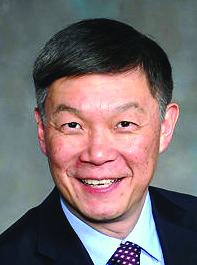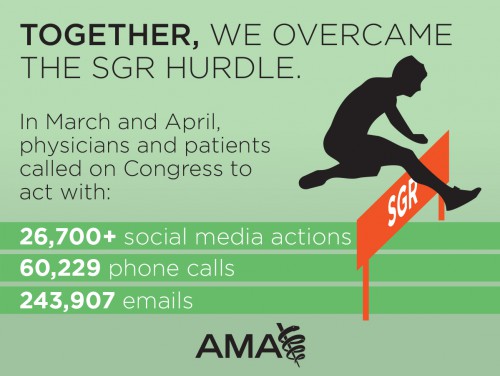The final word: Over the SGR hurdle and looking forward to the future
by Robert M. Wah, MD, AMA president

Robert Wah, MD
How did we get over the SGR hurdle? The short answer is simple: We did it together. The long answer involves a strenuous, uphill marathon of more than a decade. We physicians all have stories about how the sustainable growth rate (SGR) formula’s perennial threats of steep payment cuts created instability for our practices and uncertainty about access to care for our patients who relied on Medicare and TRICARE.
Through the years, we had countless interactions with our lawmakers about this issue and made it clear that Medicare had to be fixed. And we poured on the steam this year, calling on Congress to seize the opportunity to eliminate the SGR formula through bipartisan legislation introduced in March.

In a five-week sprint that got underway with a formal letter to Congress signed by more than 750 medical associations, we physicians and our patients used the AMA’s Fix Medicare Now campaign to flood our members of Congress with messages to pass this legislation. Here’s how they heard from us:
- More than 26,700 social media actions
- 60,229 phone calls
- 243,907 emails
This unified effort paid off. We overcame the SGR hurdle with overwhelmingly favorable votes in both chambers of Congress.
With SGR behind us, we now can build a forward-looking health care system that puts patients first—a system in which we can provide cost-effective care with top-notch health outcomes in a sustainable practice environment.
Here are five ways our health care system will begin to look different:
- Medicare and TRICARE patients will no longer face constant uncertainty over whether they might lose their access to care. The perennial threat of devastating payment cuts under SGR made it difficult for many physicians to know whether they would be able to keep their doors open for treating these patients.
- Physicians’ practices will be more sustainable. Under the new law, many of the competing quality-reporting programs in Medicare will be consolidated and better aligned. The risk of penalties also has been substantially reduced, and physicians now have potential for earning significant bonuses.
- The path will be cleared for new models of care. The new law not only removes the financial instability caused by the SGR formula but also provides monetary and technical support for those who choose to adopt new models of care suited to the 21st-century needs of physicians and their patients.
- Health outcomes will be improved in the clinic setting and the community. Chronic diseases have become the primary sources of poor health and death today. Treating these conditions requires new approaches, and the new law permanently requires Medicare to pay for care management of these patients.
- Physicians in training will be taught how to practice in the new health care environment. Even as the health care system undergoes dramatic change, an AMA consortium of medical schools is exploring how to prepare the next generation of physicians for practicing in the new environment. Students will learn how to succeed in new models of care, provide high-quality but cost-effective care, and team up with other health care professionals and the community so their patients can lead the healthiest lives possible.
While details of how the law will be implemented still need to be figured out (and rest assured that the AMA will diligently press for appropriate execution of the law), we have overcome our chief obstacle and are moving toward a brighter future. The new era of health care now before us is one of promise. Our patients will have greater stability in their access to care, our practices will be more sustainable, and doors will open for new models of care, improved health outcomes and advanced medical education.
There’s still a lot to do to reach our goals for a healthier nation, but we will achieve them by continuing to work together. Let’s continue this race and finish it strong.
Posted in: Colorado Medicine | Final Word | Initiatives | Advocacy | AMA

Comments
Please sign in to view or post comments.